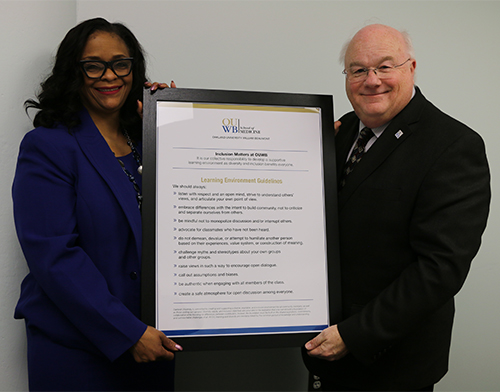
Anyone in a class or breakout room at Oakland University William Beaumont School of Medicine can now see firsthand that the school is intent on leading the way in implementation of diversity, equity and inclusion initiatives that benefit students and educators alike.
Officials recently installed posters detailing “Learning Environment Guidelines” that are aimed at “promoting an inclusive environment where students feel safe and supported — and have a sense of belonging.” The guidelines were developed and written by OUWB’s new Diversity, Equity, and Inclusion Council (DEIC).
The efforts were detailed in an email sent Feb. 11 to the entire OUWB community from Duane Mezwa, M.D., Stephan Sharf Interim Dean, and Deirdre Pitts, Ph.D., SCP-IPMA, interim associate dean for academic, faculty affairs and diversity and inclusion, and assistant professor in the Department of Foundational Medical Studies at OUWB.
“Students perform better when they have a sense of belonging in the academic environment,” said Pitts.
“OUWB is implementing best practices and programs to ensure that our educators can create a more inclusive environment for all scholars,” she said.
One step that OUWB took to improve inclusivity was establishment of the DEIC. The mission of the council is guided by OU’s overall diversity mission, but further serves to unite all OUWB-specific initiatives under one umbrella to serve the school as a whole. A cross-representation of OUWB faculty, staff and students work together to evaluate DEI needs and then make recommendations for improvement.
One recommendation was to establish a set of guidelines for inclusivity in the classroom setting. “Learning Environment Guidelines” have been posted in every OUWB classroom, including those on the three Beaumont Hospital campuses. These rules are:
- Listen with respect and an open mind, strive to understand others’ views, and articulate your own point of view.
- Embrace differences with the intent to build community, not to criticize and separate ourselves from others.
- Be mindful not to monopolize discussions and/or interrupt others.
- Advocate for classmates who have not been heard.
- Do not demean, devalue, or attempt to humiliate another person based on their experiences, value system, or construction of meaning.
- Respectfully, challenge myths and stereotypes about your own groups and other groups.
- Raise views in such a way to encourage open dialog.
- Call out assumptions and biases.
- Be authentic when engaging with all members of the class.
- Create a safe atmosphere for open discussion among everyone.
In addition, a cohort of faculty and staff are being trained to facilitate the “Stepping In” curriculum. The program provides educators with tools to identify and address bias and microaggressions both in the classroom and in a health care setting. Participants will evaluate real-life situations and work together to formulate a response.
“When incidents of bias occur, faculty and staff need to be prepared to respond. This prevents the ‘bystander effect’ which is when the presence of others discourages an individual from intervening to help a victim,” said Pitts. “Being ready to respond leads to positive change.”
Looking ahead, OUWB’s Diversity, Equity and Inclusion Council will be implementing additional programming and initiatives to more fully ingrain DEI best practices into the OUWB curriculum and culture.
“Our council is working to create an academic environment where all students and educators can thrive,” says Pitts. “The impact of these changes will reverberate beyond the walls of OUWB and positively influence the health care setting of all the communities that our students will serve.”
For more information, contact Andrew Dietderich, marketing writer, OUWB, at [email protected].

